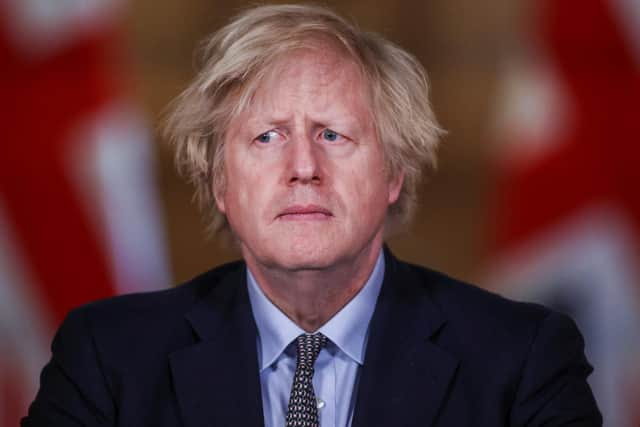Boris Johnson: Coronavirus 'unlike any other struggle' and victims will be remembered with memorial
The Prime Minister said the grief brought on by the pandemic was made “more acute because we’ve not been able to see our loved ones in their final days, to hold their hands, or even to mourn them together”.
And speaking tonight, a year since he announced the first national lockdown, Mr Johnson promised: “We will come together as a country to build a fighting and a permanent memorial for the loved ones we've lost, and to commemorate this whole period.”
Advertisement
Hide AdAdvertisement
Hide AdMr Johnson said the country was “on the path to reclaiming our freedom” but he also warned the country must be “very wary of a third wave” coming from Europe.


Chief medical officer for England Professor Chris Whitty said the number of people in hospital with Covid had “come right down, and it’s continuing to fall rapidly”.
But he said the UK had had a “bad outcome” in terms of deaths, as figures published by the UK’s statistics agencies showed there have now been 149,000 deaths registered where Covid-19 was mentioned on the death certificate.
Separately, a further 112 deaths were recorded today across the UK within 28 days of a positive coronavirus test, bringing the UK’s total to 126,284.
Advertisement
Hide AdAdvertisement
Hide AdIn Yorkshire, a further 16 deaths were recorded. The region’s total is now 10,760.
Prof Whitty said: “The general point is we had a bad outcome, many other countries have a bad outcome, what we want to do is to minimise mortality in the future.”
He warned there would be “bumps and twists on the road”, possibly including the emergence of new variants and shortages in vaccine supplies.
However the success of the vaccination rollout meant that when a new surge happens, it will be met with a “wall of vaccinated people” which will significantly reduce the ratio between the number of cases and the resulting death toll.
Advertisement
Hide AdAdvertisement
Hide AdPeople across the UK took part in a minute’s silence to remember Covid-19 victims after a terrible 12 months.
MPs and peers in both Houses of Parliament and ministers in the devolved nations marked the anniversary at midday, while NHS and social care workers also joined the pause for reflection.
The Queen reflected on the “grief and loss felt by so many” as she paid tribute to the service of health and care workers in a message to St Bartholomew’s Hospital, where the Duke of Edinburgh had heart surgery.
Mr Johnson, who was hospitalised with coronavirus himself in April, acknowledged that he would personally be dealing with the effects of the disease “for as long as I live”, as he said his “biggest priority” would be making things right for schoolchildren.
Advertisement
Hide AdAdvertisement
Hide AdAsked what, with hindsight, they might have done differently Mr Johnson, Prof Whitty, and Chief Scientific Advisor Sir Patrick Vallance all gave answers based on what was not known at this time last year.
The PM said: “I think in retrospect there are probably many things that we wish that we had known and many things we wish we’d done differently at the time.”
He added: “The single biggest false assumption that we made was about a potential for asymptomatic transmission, and that did govern a lot of policy in the early days, that misunderstanding about the reality of asymptomatic transmission certainly led to real problems.”
Asked specifically if he should have imposed a lockdown sooner, Mr Johnson said: “These are very hard decisions, and there are no good outcomes either way [...] all I can say is we took all the decisions with the interests of the BRitish people foremost in our hearts.”
Advertisement
Hide AdAdvertisement
Hide AdSir Patrick pointed to not having real time data at the beginning of the pandemic, while Prof Whitty said there was not an understanding of the speed of transmission.
Mr Johnson said there would be a time “to review the lessons” learned, but did not say when this would be.
He also downplayed the risk of a trade war with Europe over the vaccines, as tensions rose amid a threatened export ban from factories in the European Union to the UK.
Mr Johnson said: “We’re all fighting the same pandemic across the whole of the European continent and indeed much of the world.
Advertisement
Hide AdAdvertisement
Hide Ad“Vaccines are an international operation, they’re produced by collaboration between great national scientists, it’s a fantastic thing to see how they’ve been developed and will continue to work with European partners to deliver the vaccine rollout.
“All I can say is we in this country don’t believe in blockades of any kind, of vaccines or vaccine material, (it’s) not something this country would dream of engaging in and I’m encouraged by some of the things I’ve heard from the continent in the same sense.”
He added: “There’s no point in one country being immunised on its own, we need the whole planet to be inoculated.”